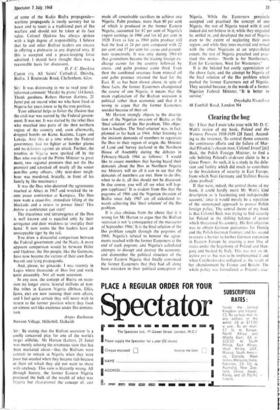Sir: By stating that the Biafran secession 'is a coolly
conceived play for one of the world's larger oilfields,' Mr Horton (Letters, 21 June) was merely echoing the. erroneous view that has been marketed about—that the Biafrans were content to remain in Nigeria when they were poor but seceded when they became rich because pt their oil which they did not want to share with anybody. This view is blatantly wrong. All through history, the former Eastern Nigeria prodUced the bulk of the wealth of what was Nigeria but championed the concept of, and
made all conceivable sacrifices to achieve one Nigeria. Palm produce, more than 80 per cent of which is produced in the former Eastern Nigeria, accounted for 82 per cent of Nigeria's export earnings in 1900 and for 62 per cent in 1920. Even as late as 1960 palm produce still had the lead at 24 per cent compared with 22 per cent and 17 per cent for cocoa and ground- nuts respectively. It was only during 1961-63 that groundnuts became the leading foreign ex- change earner for the country followed by cocoa, and palm produce came third. Even then the combined revenues from mineral oil and palm produce retained the lead for the East. If, as has been shown above, in spite of these facts, the former Easterners championed the course of one Nigeria, it means that the main explanation of the Biafran secession is political rather than economic and that it is wrong to argue that the former Easterners seceded because of their oil.
Mr Horton strongly objects to the descrip- tion of the Nigerian invasion of Biafra as the 'final solution' of the Ibo problem. This objec- tion is baseless. The 'final solution' was, in fact, planned as far back as 1964. After listening to the insistent demands of members to repatriate the lbos to their region of origin, the Minister of _Land and Survey declared in the Northern House of Assembly during the debates in February-March 1964 as follows: 'I would like to assure members that having heard their demands about the lbos in Northern Nigeria my Ministry will do all it can to see that the demands of members are met. How to do this, when to do it, all this should not be discussed. In due course, you will all see what will hap- pen (applause).' It is evident from this that the pogroms of 1966 and the Nigerian invasion of Biafra since July 1967 are all calculated to- wards achieving this 'final solution' of the Ibo problem.
It is also obvious from the above that it is wrong for Mr Horton to argue that the Biafran secession is not 'a consequence of the massacres of September 1966.' It is the final solution of the Ibo problem sought through the pogroms of 1966; Nigeria's refusal to honour the agree- ments reached with the former Easterners at the end of each pogrom; and Nigeria's calculated attempts to disrupt and destroy the economy, and dismember the political structure of the former Eastern Nigeria that finally convinced the former Easterners that they had all along been mistaken in their political conception of Nigeria. While the Easterners genuinely accepted and practised the concept of one Nigeria, the rest of Nigeria toyed with it and indeed did not believe in it; while they migrated to, settled in, and developed the rest of Nigeria even to the extent of neglecting their own region; and while they inter-married and mixed with the other Nigerians at an unparalleled extent, the rest of Nigeria preached and prac- tised this motto: 'North is for Northerners, East for Easterners, West for Westerners.'
It is the belated but costly appreciation of the above facts, and the attempt by Nigeria of the final solution of the Ibo problem which pushed the former Easterners out of Nigeria. They seceded because, in the words of a former Nigerian Federal Minister, ' It is better to survive.'
Onyekaba Nwankwo
48 Fonthill Road, London N4










































 Previous page
Previous page